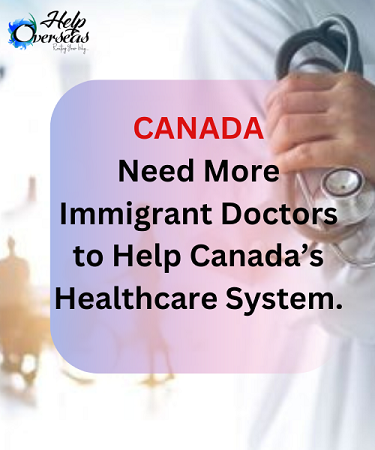Canada Need More Immigrant Doctors to Help Canada’s Healthcare System

The Canadian government launches a new health care stream as part of the economic immigration program.
In the last ten years, the population of Canada has grown by more than five million, but the number of medical residencies—positions that teach future doctors—has only climbed by 167 in the same time frame. This complicates the process of finding a family physician for many Canadians. According to a recent news article, almost 6.5 million Canadians lack regular access to a family physician. In Canada, the expanding number of people and the scarcity of doctors are creating issues for the populace.
In an attempt to address this issue, the federal, provincial, and territory governments are attempting to increase the number of foreign-born healthcare workers. Their objective is to alleviate Canada's scarcity of healthcare workers by boosting immigration of qualified physicians and nurses. This has led to a greater influx of qualified healthcare workers into the country from both the federal and provincial/territorial levels of government.
Obstacles for Foreign Medical Graduates (IMGs):
"One out of every four healthcare sector workers" in Canada are immigrants, according to data from the Government of Canada dated December 2022.
When it comes to specific professions, the percentage of immigrants among healthcare workers in Canada is as follows:
· 23%registered nurses
· 35% nursing assistants and those working in similar fields
· 37% of the pharmacy workforce
· 36% of doctors.
· 39% of dentists in
· 54% of dental techs and those working in similar fields
Despite efforts to increase the number of foreign-trained physicians practicing in Canada, CBC News reports that International Medical Graduates (IMGs), as these doctors are called, have difficulty obtaining a medical residency. This is due to the fact that the number of IMGs who are eligible for residency program spots is limited. Moreover, residency programs in Canada are managed by medical schools, who frequently favor their own graduates over physicians with foreign training, making it challenging for IMGs to practice medicine there.
International Medical Graduates (IMGs), or physicians with foreign training, encounter particular challenges in Canada. A number of IMGs are limited in number, hence they frequently face difficulties securing medical residencies. Immigrant medical graduates (IMMGs) face difficulties in pursuing medical practice in Canada due to the residency system being managed by medical schools who prioritize their alumni.
Talking About the Issues IMGs Face:
Canada is investing in the recognition of foreign credentials in an attempt to address the problems encountered by IMGs. To guarantee that immigrants with foreign education and expertise are properly recognized for their credentials, the Canadian government has made a commitment to invest in foreign credential recognition.
Causes of the Shortage of Family Physicians:
The lack of family physicians in Canada is a result of a number of issues, including low increase in medical residencies and a decline in interest in family medicine among Canadian medical graduates. Access to family medicine is severely hampered by graduates' waning interest in the field and the meagre expansion of medical residencies.
Actions Made to Close the Gap :
Canada is investing in the recognition of foreign credentials in addition to recruiting more qualified healthcare professionals from outside. The government intends to award $86 million to 15 groups in order to assist around 6600 health professionals with international education in having their credentials accepted, so guaranteeing that qualified immigrants are duly acknowledged.
Prince Edward Island (PEI): A new medical school will open in the fall of 2025 at the University of PEI.
British Columbia (BC): Simon Fraser University in BC has declared that it will establish a new medical school at its Surrey campus in 2026.
Ontario: For the next five years, the province plans to create 449 additional "postgraduate medical training spaces." Of these, 154 spots at various medical schools in the province "are expected to come online later" in 2024.
To address the lack of family physicians, both the federal and provincial governments are acting. The goal of Canada's category-based Express Entry lottery is to increase the number of foreign-trained physicians in the nation; one of the main occupational categories for this purpose is healthcare. At the provincial level, promises have been made to build new medical schools and increase the capacity of existing ones in a number of provinces.
The lack of family physicians in Canada is a serious problem that affects both the country's healthcare system and its citizens' quality of life. By tackling the obstacles encountered by international medical graduates and proactively augmenting medical school capacity and medical residency numbers, Canada hopes to fulfill the escalating need for family physicians and guarantee that its populace has access to high-quality healthcare.
HelpOverseas Immigration is a leading consultancy located in Pune, India. We offer the best advice and counseling for immigration to Canada for immigrants—individuals or families; who wish to travel abroad and live there permanently. Our aim is to help you settle with ease in any country!
To know more about the details and the complete procedure of Canada Immigration, our experts will guide you through the entire process step by step to make your immigration easy. Feel free to contact us at +919145227575. We will help you in Routing your way at HelpOverseas Immigration.
- Art
- Causes
- Crafts
- Dance
- Drinks
- Film
- Fitness
- Food
- Spellen
- Gardening
- Health
- Home
- Literature
- Music
- Networking
- Other
- Party
- Religion
- Shopping
- Sports
- Theater
- Wellness
- IT, Cloud, Software and Technology


